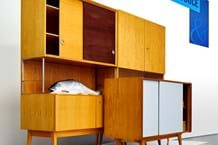ANTIQUE barometers have been excluded from the forthcoming European Union ban on the use of mercury.
Although manufacturers of scientific instruments will no longer be permitted to make new devices using mercury, the legislation includes an important clause giving a permanent exemption for antique measuring instruments, defined as those that date back more than 50 years.
Specialist dealer Derek Rayment who is offering a range of antique barometers at the summer Olympia fair this week, told ATG: “The legislation applies only to the manufacture of new instruments containing mercury. Historical instruments can be bought, sold, imported and exported as before.”
He said that the EU law is unlikely to affect the day-to-day running of his business directly, but it might affect him indirectly by hitting those who supply the vital parts needed for barometer restoration.
Over the next week, Mr Rayment is due to meet Lord Rooker, the UK minister dealing with the issue. He said members of House of Lords were already aware of the “stupidity of the ruling”.
“It is absurd to argue that these instruments are dangerous,” he said, pointing out that the levels of mercury in barometers are very small and that the chemical only breaks down under high temperatures.
The EU law is designed to restrict toxic mercury from entering the environment and is primarily aimed at its industrial use. However, instruments such as thermometers and barometers also fall within its scope.
Although an initial exemption for barometers was gained in 2006, this amendment was rejected by the EU’s enviroment committee last week. This means that after a two-year grace period, the production of new barometers using mercury will be banned.
Although trading in antique barometers can continue, the EU law presents a problem when it comes to repairing or recalibrating barometers or longcase clocks with mercury-regulated pendulums, for which access to mercury stocks is essential.
A spokesman for the EU environment committee admitted to ATG that this was the “biggest problem” with the new law. He said they are yet to finalise a way to stock mercury legally for specialist uses. As well as for barometer restoration, mercury is required to produce essential equipment used in hospitals like blood-pressure gauges.
British Conservative MEP Martin Callanan, who has been supporting the barometer trade, said: “If the many thousands of people up and down the country that have an existing barometer cannot get it repaired, they will throw it away, which will result in more mercury entering the environment.”
In the US, Sotheby’s and Christie’s have not been trading in mercury barometers for over a year. This policy decision was not because of US trading laws, which are generally less restrictive, but rather a fear of possible litigation.
However, a dozen states in America have now adopted mercury management legislation. But in March this year the state of Maine passed a bill amending their legislation reinstating the legal trade and restoration of antique barometers, defined as instruments over 100 years old. Indiana also exempts antique barometers from its mercury laws.
Barometers over 50 years old escape EU mercury ban
But supplies for repairs could still prove a problem




